Tommy Emmanuel on fatherhood, avoiding retirement and being inspired by Taylor Swift
Ahead of an Australian tour, the master guitarist speaks about giving his all on stage, avoiding retirement, searching for silver linings and being inspired by the music of Taylor Swift.
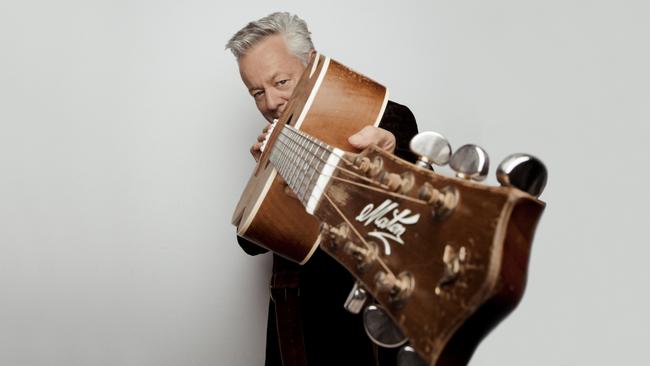
Tommy Emmanuel, 69, is a Grammy and ARIA Award-winning guitarist and composer born in Muswellbrook, NSW and now based near Nashville, Tennessee. Ahead of an Australian tour, Emmanuel gives an extended Confessional Q+A about fatherhood, avoiding retirement, looking for silver linings and being inspired by the music of Taylor Swift.
Review: Tommy, anyone who’s seen you live knows the joy you bring to your performances. What does playing for a crowd do for you?
Tommy: It’s everything to me. As much as I enjoy playing, even just for my own pleasure, there is no greater thrill for me than to play to people. Playing for yourself is OK, and of course I’m listening to everything I’m doing, and I’m making sure that everything’s in tune, everything’s in time, and I’m trying to do the best I can – but at the same time, I’m flying that kite and getting the air to take it, and take me with it. That’s what I get from an audience. I get that, “Holy shit, anything’s possible” [feeling], you know?
Playing for an audience is the greatest thrill that I know; and the older I get, the more I want to really kick some butt. The more I want to get out there and really go for it. I take a lot of risk when I get out there, especially in songs like Guitar Boogie: I just let it fly and see what I can come up with absolutely on the fly. Because I believe that that’s what people want to see. They don’t want to see you doing your comfortable, well-rehearsed show that you can play flawlessly; they want to see a guy risking everything to give them a good time. If I go to see another artist that I really admire, and I think they’re coasting, I get pissed at ’em, you know? I never coast out there, ever.
That desire to kick butt: is that related to growing older, sensing you have less time than you did as a younger man?
Not necessarily. It’s always been in my blood, ever since we were little. I mean, [my brother] Phil and I took no prisoners when we played together. It was all or nothing, you know? When I had my band, holy smoke; there were nights where we’d come off stage and we’d just be [elated], like, “This is so great!”. I was playing electric guitar a lot more – I’m talking about way back with [1991 album] Determination and [1993’s] The Journey, that period in the early ’90s; I used to run around the stage like a kid. I was all over the place, and that’s how I liked it. People would say: “How are people going to take you seriously if you’re always running around? You’re supposed to be a serious musician!” And I said, “No, no, no – I want to have fun out here, and when I’m having fun, the audience is having fun”. If I don’t be myself out there, how am I being true to my audience?
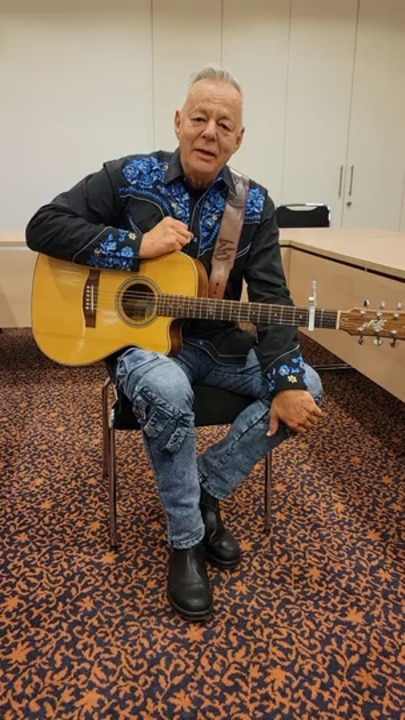
Good point. I believe you recently spent three days immersed in the music of Taylor Swift, which surprised me, as massively popular artists like her are often disparaged or dismissed by older listeners.
That’s exactly what they did with The Beatles, and you name it; to just about every artist worth their salt. I can remember when my mother said to me, “Don’t listen to that – it’s rubbish”, because she thought it was “evil rock ’n’ roll music”. Many years later, I’m playing in the Civic Theatre in Townsville, and my mother’s at the show; she comes backstage and says: “What was that beautiful song where you played all these harmonics … ?” I said: “That was a Beatles song called Michelle.” [smiles]
See, Taylor Swift getting where she got didn’t happen by accident, and it didn’t happen overnight; it happened by how hard she works, how good she writes, and the good people around her, and all that. Her records sound so good on radio, they’re just mind-blowing, right? It’s not my cup of tea, and I don’t have a Taylor Swift record at home or anything like that – but when I hear her music, I’m always impressed.
Taylor’s songwriting inspired your own, correct?
I was listening to her channel on [online radio station] Sirius XM, called Taylor’s Version; she was talking about her new album that she was going to release [2024’s The Tortured Poets Department]. She played a couple of tracks from that record, and I thought, “Holy hell, I’ve got to listen to this”. The album came out the next day, and that’s all they played, so that’s all I listened to, and I got to know the songs. I was looking for an idea for a chorus of a song of mine. I was looking to see, “What is it she does that just reaches out and grabs you?”.
It was this: she’s very clever, and there’s a lot of words going on in her music. When the chorus comes in, it’s almost one note, and the chords change – but the note keeps coming at you, with the same message. That was the idea; so this song I wrote, called The Drowning Heart, the chorus [now has] the same note over [and over], with the chords changing underneath. That was a direct influence from her. I don’t know whether I would have thought of that or not – but I know I needed to immerse myself into something else, and I’m happy to do that. And I don’t really care what people think, or say, “You couldn’t listen to that crap, could you?”. I just say, flat out: “I love her stuff.”
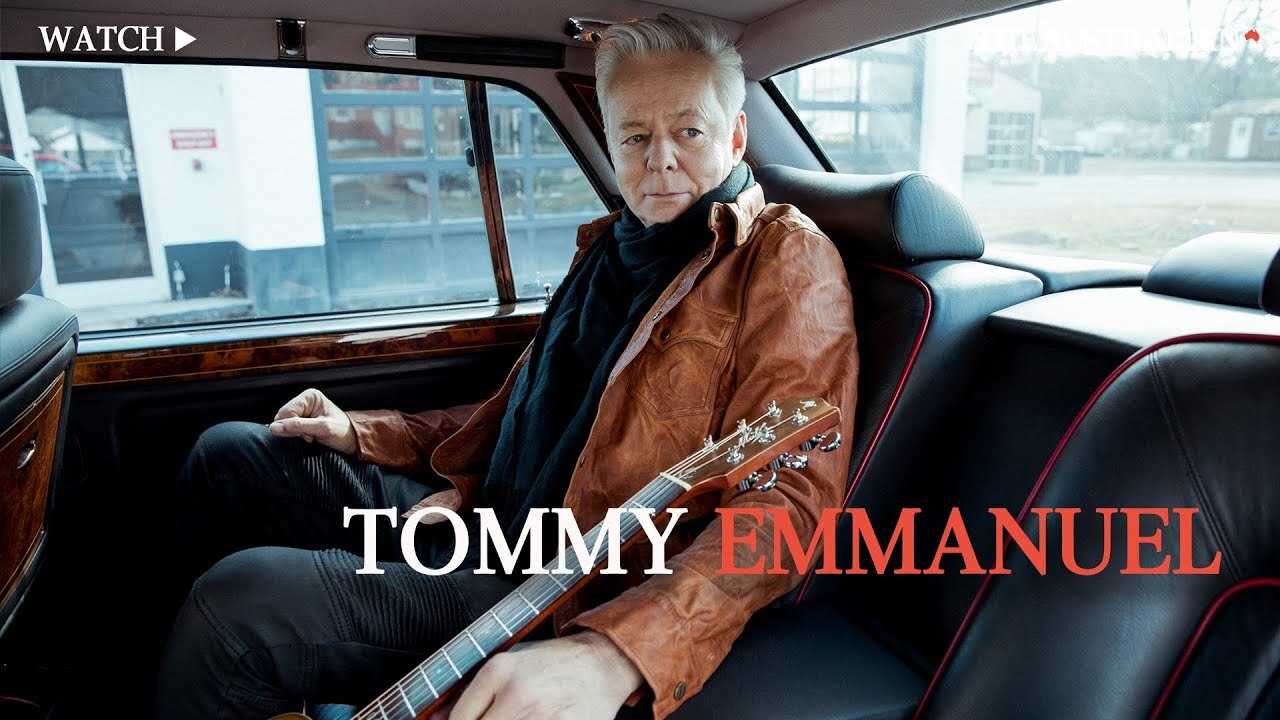
What surprised you about becoming a parent?
How hard it is. I can now say that everything about life is easy – except raising children. That’s hard. You second-guess yourself all the time, and you make a lot of mistakes, and hopefully you learn; the mother teaches you so much when you’re the father. I learned so much from the two ladies I was married to – at different times, of course. [smiles] Having children is a big, big responsibility. If you say you’re going to do something, you’ve got to do it; you can’t just not show up. That doesn’t happen – not with kids.
What’s the hardest thing about juggling a career in the performing arts with parenting?
You have to make peace with the fact, and you have to be honest … this is what I believe helped me to survive being divorced the first time. I knew that I was not going to stop touring and playing, because I was accused of being an absent father, and it really hurt me. But eventually, I had to admit: “This is who I am. This is what I do, and you’re going to have to be OK about it. I’m going to see you as much as I can. I’ll stay in touch with you as much as I can – and when I finish working, I’ll come and see you.”
I’m not the type of person who can get a 9-5 job, come home and put my slippers on. That’s not me. That’s not who I am – and you already know that. So I had to call a family meeting, when my girls were much smaller, and I had to just lay it out like that: “This is what Daddy does, and Daddy does this because it’s important. And it’s going well, so you’re living in a beautiful house and going to a good school in a very expensive country called England. I have to work really hard to make that happen for you, because that’s what your mother wants.” I had to find a way of telling everyone straight, flat-out: “You’re going to have to be OK about it, because I’m not going to stop touring. This is what I do.”
That tension between being an adored international performer and being needed at home as a parent seems like one of the most challenging aspects of touring. Would you agree?
Well, it almost killed me, that’s for sure. Feelings of guilt and shame really fuelled my drinking and drugging and stuff like that. I hated myself for it – but I loved everything when I was on stage, you know? I had to find the answer to that, and find my peace, and stop beating myself up. I don’t shut the door on the past; I keep the door open, because I can help other people, in their lives, by what I’ve gone through. I can tell them how I survived it, and what the answers are.
Calling that family meeting – does that align with the idea that honesty is the best policy?
It’s the only policy. It kind of sets you free; I’m never afraid to just say it like it is, because I don’t have time for tiptoeing around on eggshells. Let’s just get to the point and save ourselves some tiptoeing. Let’s just get to it, you know?
Do you believe that hardship is necessary to create great art?
Yes, hardship in everything is necessary, because what comes from hardship is peace and a good feeling in the knowledge that you’ve been through a lot, and you made it through to the other side, and all these things were meant to shape you, somehow. I can’t say that I’ve ever felt like giving up; even when my world went upside-down, I still didn’t want to give up. I’ve never really considered, “Well, I’ve been doing this a while – I should hang it up and just go and be Granddad, and live up the road from my little ones”. It’s not me. I’m like, “It’s 2025 – let’s kick some ass!”. That’s me.
Plenty of people strive in their working lives to get to retirement age and relax. What is it about you that shuns that idea?
Well, I mean things like going to the beach every day, going fishing, taking my time, all that sort of stuff; it’s so attractive and so nice – but it’s not as attractive as a full house. [smiles] Besides, I’m not at a point where I feel I can hang it up, because I’m starting to get somewhere with it. I’m starting to realise, “Holy shit, this is fantastic!”. People couldn’t imagine that, but it never gets old for me. I can do 300 shows in a year, and I’ve had a couple of days off, and I’m already thinking about, “Well, when are we getting back out?”. It’s just how I am.
That’s the engine that drives you and, clearly, there’s an international demand from people who want to see you play. You’re giving the people what they want.
Well, that’s a pretty good statement: I’m giving the people what they want. The other day I was talking with Steve, my tour manager, and I said, “We are so lucky, because we make a sound and do something that no one else does – and people love what we do. I just can’t believe it”. And I love the fact that I can get in my car and go down to the supermarket and go shopping. I can go across to Starbucks. I can go to the Chinese restaurant. People say hello, but no one’s screaming and calling the police; I’m invisible out there, and I love that. I’m not looking for fame, at all. I’m looking to do a good job, make a good living, and try to keep creating; and maybe along the way, drop some M&Ms so other people – other young players – can follow my M&Ms: “This is what I did – and if you work as hard as I did, it might work for you, too.”
What colour M&Ms?
Oh, I believe in all of the colours – I don’t just want the blue ones. [laughs]
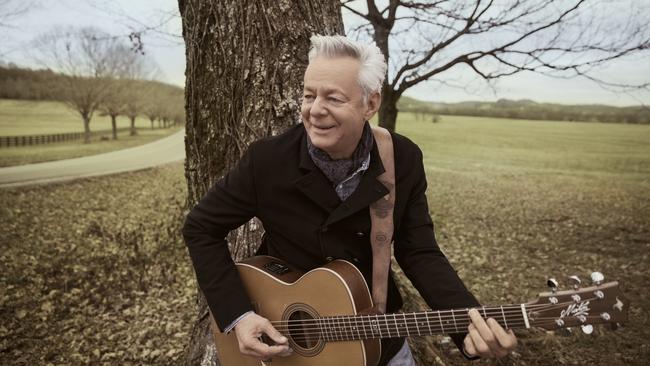
Have you read any great books recently?
I just finished BB King’s book, called Blues All Around Me. I related to so much in that book of his early days, and my feelings that I’ve always had about the blues, because too many people equate the blues with, “Everything’s so hard, everything’s so horrible, I’m down and out, and my girl has left me …”. I’ve always thought the blues is a style and a feeling. It can be whatever you want it to be. I didn’t grow up playing the blues, but I do love it, and I do love certain players.
There’s blues in everything I do; you can’t escape it. But it’s not a “Woe is me” blues – it’s a “Yeah, this is the answer” blues kind of thing. BB King has that same attitude: he hears the silver lining with every dark cloud that someone’s playing about. That’s kind of like a metaphor for life: there’s going to be dark clouds, there’s going to be hard times, and there’s going to be some shit hitting the fan – but always look for the silver lining. Always look for, “What can I learn from this experience?”.
That reminds me of an idea from Stoic philosophy: the only thing you can truly control in your life is how you respond to things.
Exactly. It’s such a wonderful thing. In the AA program [Alcoholics Anonymous], it says we have to accept where we’re at, what’s going on, how life is, how people are, how you’re situated; we have to be accepting of it. Otherwise, it’s going to drive us crazy, you know? If things don’t go your way, don’t go thinking that the world is against you, or people just don’t get you, or whatever. [Instead, think] “This wasn’t meant to happen. What can I learn from this?”.
Where does the Serenity Prayer of Alcoholics Anonymous fit into that?
The Serenity Prayer is: “Grant me the serenity to accept the things I cannot change.” In other words, I can’t change you; I can change me, and I can change how I respond to you. People, places and things are the things that drive most people crazy: “The government should be doing this, and the council should be doing that, and my neighbour should be thinking this way … ” You can’t do that; you’ve got to accept people the way they are. My brother Phil was really good at that. He taught me so much about accepting people exactly as they are.
You turn 70 on May 31 – what does that number mean to you?
It means I’m going to really kick some ass this year. [laughs] That’s what it means! It means that I have to be careful, and I’m not going to be skydiving, and I’m not going to be hiking up Kilimanjaro. I’m not going to do any of that; I’m going to do what I do. I’m going to take care of my body, and I’m going to rest when I need to, and try to be the most useful tool that I can be.
You’re a pretty useful tool, Tommy, I’ve got to say.
I’m workin’ on it. [smiles]

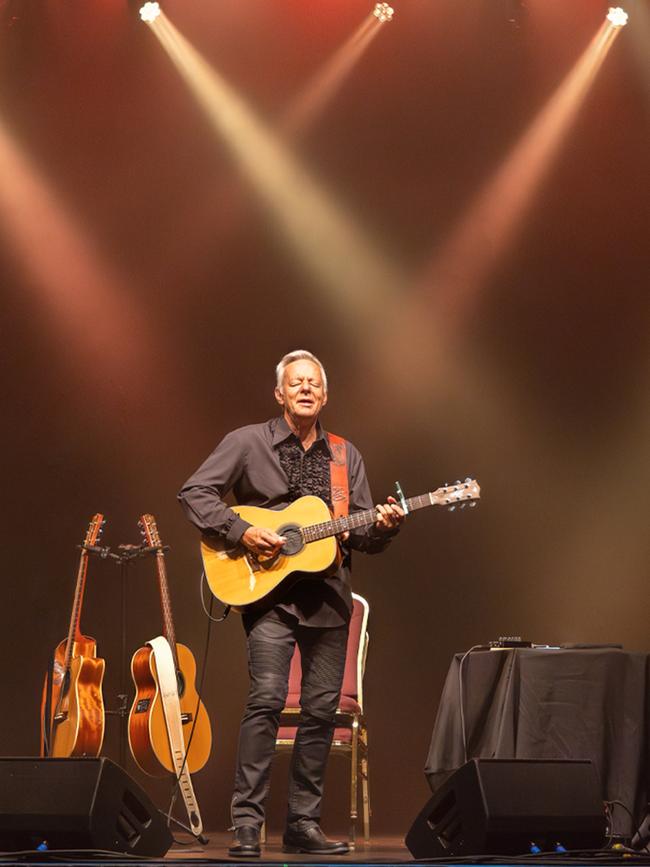
When you’re gone, what do you hope to be remembered for?
For being an example of someone who just followed their instinct and vision for where they belong. The reason I’m playing the [Sydney] Opera House is because I believed long before I got there that that’s where I should be playing. Whatever work I have to take, I will get there; there’s nothing surer than that. You have to know where you’re supposed to be, I think. I call that a vision; my vision is that I’d always wanted to be a concert player. I knew that’s where I belonged; I just didn’t know how it was going to happen, or how it was going to unfold. But some people can do it, and others run out of steam too early. If you said to me, “We’re going to meet at 7am”, I’d be there at 10 to seven. I hate being late for anything; and if you told me to bring $10, I’d bring $100. That kind of attitude is what has always set me on a good path with people.
Lastly – what is the guitar to you?
It’s a way of me telling you who I really am. It’s my way of expressing my deepest things inside; they come out here [through the sound hole], you know? Somebody said to me the other day, “Have you got your hands insured?”. And I said: “Yeah, I do, of course; I’ve got everything insured.” And they said: “What happens if you have an accident, and you can’t play with your hands?” I said: “I’ll learn to play with my toes.” [smiles]
Tommy Emmanuel’s nine-date Australian tour begins in Sydney (May 16) and ends in Adelaide (May 31). Tickets: tommyemmanuel.com. To watch Review’s full interview with Tommy on YouTube (54 minutes), click here.



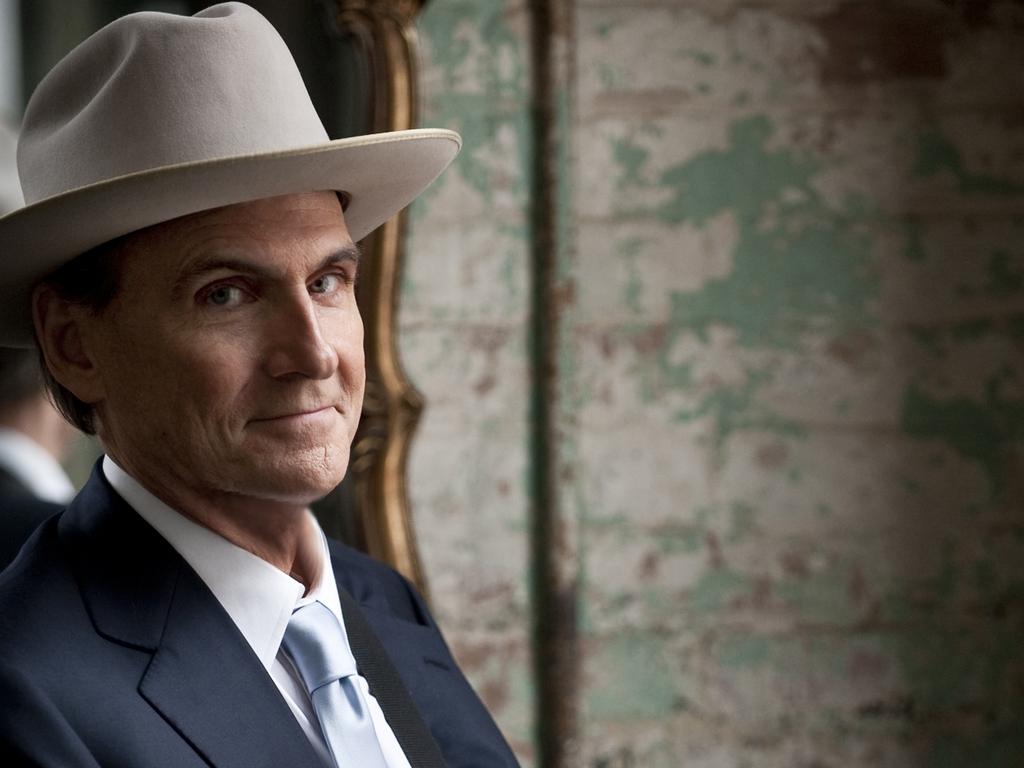

To join the conversation, please log in. Don't have an account? Register
Join the conversation, you are commenting as Logout